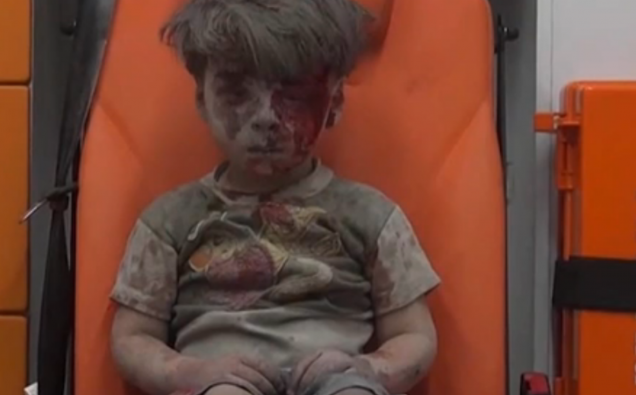
The haunting image of a shocked, dazed little boy pulled out of the rubble of a destroyed home in Aleppo has sent shock waves across the world.
But so was the case last year with another heartbreaking image, when a toddler was found dead lying face down on a Turkish coast. It made no difference to the world capitals’ response to the Syrian conflict and now after thousands more dead, any progress toward ousting Bashar al Assad looks as unlikely as ever.
The photograph of the five-year-old Omran Daqneesh sitting alone in an ambulance immediately after his rescue is a cruel reminder of the disconnect between the world leaders and the suffering humanity in conflict and impoverished zones.
It also speaks volumes about the inhumanity of those bombing Syrian civilians indiscriminately. The Syrian regime and Moscow have much to answer for.
Will the calls for peace fall on deaf ears again, as they have been since Assad started massacring democracy-seeking people. He crossed red lines, made fun of deadlines and has yet survived with impunity.
Coupled with Assad’s genocide of his own people, the ISIS terror, and total collapse of the Iraq and Syria have pushed millions out of their homes with repercussions in the form of refugee exodus, new security and economic challenges for Europe.
Journalists, newscasters, humanitarian workers, UN officials and observers have regularly spoken out against the horrors and terrors of the ongoing conflicts.
But why is there no end to these wars and conflicts? Apathy, failure of the international system, or simply the failure of world leadership? Wars demand more engagement, not estrangement.
The ceremony of innocence is drowned not only in Syria but in multiple Middle Eastern and African war-afflicted countries. In South Asia, civilian protesters in Indian-controlled Kashmir have been killed brutally by the Indian forces.
What does it mean for the future? Even the social media, which created such great hopes at the start of the Arab Spring, has not been able to effect a change.
The UN says more than 3.7 million Syrian children under the age of five know nothing but displacement, violence and uncertainty.
The precarious conditions of civilians caught in Aleppo have many tales of horror. where approximately 100,000 children rely on water from wells potentially contaminated by faecal matter and are unsafe to drink.









